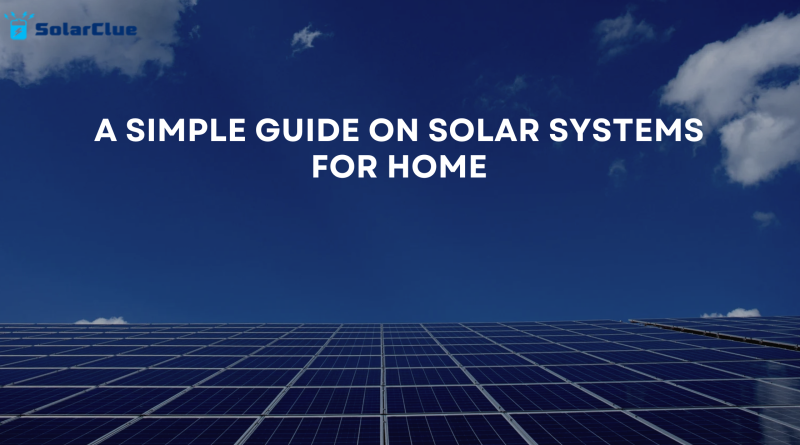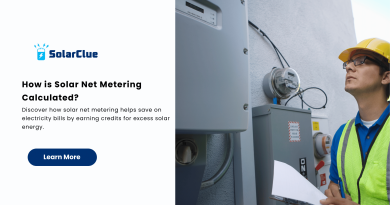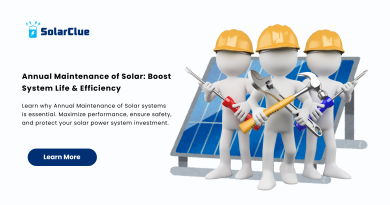A Simple Guide on Solar Systems for Home
Welcome to our guide on solar systems for homes! In this blog post, we’ll take you through everything you need to know about setting up solar power for your house. From understanding solar panels to choosing the right inverter, we’ve got you covered. Whether you’re new to solar energy or looking to upgrade your existing setup, this guide will help you navigate through the process in a simple and easy-to-understand way.
Table of Contents
What is Solar Systems for Home ?
Understanding Solar Panels:
Let’s start with the basics: solar panels, These are the heart of any solar system. Solar panels capture sunlight and convert it into electricity. They come in different types and sizes, but the basic principle remains the same: harnessing the power of the sun to generate clean and renewable energy for your home.
Choosing the Right Solar Inverter:
Now, let’s talk about solar inverters. While panels capture sunlight, inverters play a crucial role in converting the direct current (DC) electricity produced by the panels into alternating current (AC) electricity that can be used in your home. There are different types of inverters – string inverters, microinverters, and power optimizers – each with its own advantages. The choice depends on factors like your roof space, shading issues, and budget.
Mounting Structure :
These provide a secure and stable platform for mounting solar panels on the roof or ground. They are designed to withstand various weather conditions and ensure optimal sunlight exposure.
Monitoring System :
Many modern solar systems come with monitoring systems that allow homeowners to track the performance and output of their solar panels in real-time. This helps in optimizing energy usage and identifying any potential issues.
Battery Storage (Optional) :
Some homeowners choose to install battery storage systems along with their solar panels. These batteries store excess electricity generated during the day for use during periods of low sunlight or at night, increasing energy independence and reliability.
Benefits of Solar Systems for Home:
Why should you consider installing a solar system for your home? There are several benefits:
1.Reduced Electricity Bills : By generating your own electricity from sunlight, you can significantly lower or even eliminate your monthly electricity bills.
2.Environmental Benefits: Solar energy is clean and renewable, producing no greenhouse gas emissions or air pollutants during operation, thereby contributing to environmental sustainability.
3.Energy Independence: With solar panels, you become less reliant on traditional energy sources, giving you more control over your energy consumption.
4. Long-term Savings: While the initial investment in a solar system can be significant, it often pays off over time through savings on electricity bills and potential incentives or rebates offered by governments or utilities.
Overall, solar systems for homes represent a sustainable and economically viable alternative to traditional fossil fuel-based electricity generation, contributing to a greener and more energy-efficient future.
Installation Process :
Installing a solar system may seem Challenging, but it’s actually quite straightforward with the help of professionals. The process typically involves:
1.Initial Assessment: A solar provider assesses your home’s suitability for solar panels and recommends the best system for your needs.
2.Permitting and Paperwork: They handle the necessary permits and paperwork required for installation.
3.Installation: The panels and inverters are installed by trained technicians.
4.Grid Connection: Once installed, your system is connected to the grid, allowing you to start generating electricity.
Maintenance and Monitoring:
Once your solar system is up and running, it requires minimal maintenance. Periodic cleaning of panels to remove dirt and waste ensures optimal performance. Many systems also come with monitoring tools that allow you to track energy production and detect any issues early on.
Conclusion:
You’ve reached the end of our simple guide on solar systems for homes. We hope this blog post has provided you with valuable insights into the world of solar energy. Remember, choosing the right solar panels and inverters can make a big difference in the performance and efficiency of your system. Whether you’re motivated by cost savings, environmental benefits, or energy independence, going solar is a decision you won’t regret. If you have any questions or need further assistance, don’t hesitate to reach out to a trusted solar provider in your area. Here’s to a brighter and greener future with solar power!
Visit SolarClue® to see the best Solar Inverters. SolarClue® actively sells solar energy products at discounts of up to 50% on its online marketplace.
Frequently Asked question:
1.How much solar power is required to run a house?
The average solar panel system for a home in India will typically consist of around 10-15 solar panels.
2.Which type of solar system is best for home?
Monocrystalline panels typically have the highest efficiency and power capacity.
3.Is solar system good for home?
A home solar energy system is one of the most popular and efficient alternatives to traditional power sources. Solar panels have many environmental benefits and can save homeowners money over the long term.
4.What size solar system for family of 4?
Depending on what type you choose and the size of your roof, a large family such as yours (four people) could require anywhere from 3 to 8 solar panels in total in order to cover all their energy needs with renewable energy sources like sunlight.




